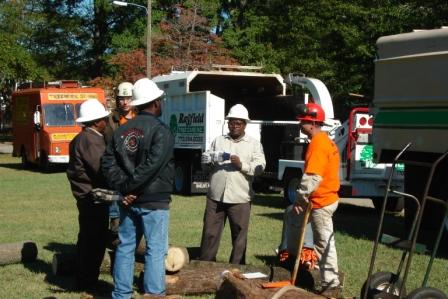1) Electrical Hazard
Station
a.
How to identify different lines. A field walk for identification of lines.
b.
What do you do when you see lines?
c.
What do you do in case of an electrical emergency? A few mock drills will be
practiced.
2) Ground Safety Station
a. Personal protection equipment.
What is it? Different types of gear are ready to try on.
b. How you can make your work site
safer. Establishing a work zone and drop zone.
c. How to do a daily job briefing
so everyone knows their tasks, potential hazards, and communication systems
that will be used.
d. Communication. How to
safely work as a team? Practice different voice command and response calls.
Practice whistle use. Copies of call signals handed out.
e. What do you do in case of
an emergency? Practice protocol. A blank daily emergency form will be supplied
(for duplication) to everyone for emergency uses.
f. How
to watch out for each other and speak up for safety.
3) Ground Operations
Station
a. How to know a saw is ready to
use.
b. What safety gear do you
need before cutting?
c. How do you safely
start a saw? Field practice.
d. What is good cutting
technique? Demonstration of good and bad cutting technique.
e. What are safe and
easy ways to move heavy wood? Practice manual methods using a wood pick, cant
hook, and hand trucks. Proper lifting demonstrated and practiced.
4) Hazard Assessment
Station
a. Assess a tree’s safety using 4
zones of assessment. Wide angle view, ground view, trunk view, crown view.
Materials of what to look for and the different zones handed out.
b. Tap a tree using a mallet for decay
detection. Practice on a tree and wood pieces.
c. Drill a tree using a
cordless drill for decay detection. Practice on pieces of wood.
5) Knot Tying
Station:
a. Learn a few important knots you will
use every day. Participants will tie and untie selected knots many times to set
them into memory.
b. How to set up a Porta Wrap and other
lowering devices. Practice on a tree.
6) Throw Line Station:
a. Throw
line gear and their uses including: different weights and lines, and the Big
Shot. Different gear on hand for field practice.
b. Throw
line safety. How to avoid common
mistakes.
c.
Throwing techniques, including different line grips and throws, line
management, and the Big Shot. Practice in an open field.

For Information
Donna
Rayfield,
Executive
Director, GAA
Office: (770)
554-3735
E-mail:georgiaarborist@bellsouth.net